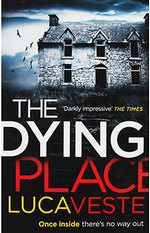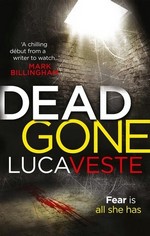Good grief! It’s taken me almost a year to read the second in this series? I’ve got to get this TBR under control.
—
 The Dying Place
The Dying Place
by Luca Veste
Series: Murphy and Rossi, #2
Paperback, 383 pg.
Avon, 2014
Read: January 24 – 27, 2018

You can’t choose the last words you ever say to your child — and that’s what they are, no matter what age — as they leave the house. Off to school, off out with friends. Off to work, or on a date. You don’t think of them as last words. Just another part of the ongoing conversation, the never-ending role as a parent.
But at some point, they will be the last words you say to your child, and for too many parents in these pages, those words come a lot sooner than anyone expected or wanted. Which is just part of what makes this novel so effective and devastating.
So often (arguably, too often) in books about mass killers, the killers are depicted as geniuses, psychopaths, sociopaths, or a combination of thereof. The villains of this book (without giving too much away, I think) are regular people — people you pass by every day, see in stores, say hi to walking down the hall at work, or maybe even chat with a bit by the coffee pot. They’re hard-working, responsible adults — vote, pay taxes, help their neighbors, maybe raised a few kids. But life has dealt them one too many band hands and they make some horrible choices in response. And then things spiral out of control.
The victims aren’t the easiest to sympathize with — at least on the surface — they’re young men, technically adults, but kids really. Petty criminals — felons-in-training, on the whole — loiterers, drug users, public drunks, vandals. Not the kind of criminal you stay awake at night worried about, but you certainly don’t want your kids turning out like them or your daughters dating them. On the whole, men who could profit from a good mentor, like the folks in the previous paragraph.
That’s more spoiler-y than I tend to go around here, but that’s just the first 50 pages. One of these ne’er-do-wells shows up dead on the steps of a church, bringing Murphy and Rossi into the story, investigating this murder and eventually understanding that there’s more going on. This particular murder victim has been missing for months, but given his frequent delinquency, no one other than his mother, took his disappearance as anything to be concerned about. The reader, by this time, knows that he’d been kidnapped by our fine, upstanding citizens for the purpose of (re)educating him and redirecting his life — up until it was ended, and he wasn’t the only one being (re)educated in this fashion. The question is, will Murphy and Rossi catch up to the reader’s information in time to stop them before another young man is killed?
Pretty much at this point, the reader can plot the rest of the book and do a pretty good job of it. What the reader won’t be able to do is pace it like Veste does — it seems like he breaks several Basic Thriller 101 rules on that front. More than once I muttered, “What, he’s doing that now? Already?” (and once or twice the opposite — “he finally got around to this?”). He may have broken pacing rules, but he did so in a way that worked. Which is really all that matters, right?
It’s the characterizations that bring this home — Murphy and Rossi dealing with their demons as well as the mystery surrounding the missing and then murdered victim; the kidnapped men/boys; as well as the kidnappers. He doesn’t dive too deeply into the various kidnapper’s frame-of-minds, just enough that we understand what they did and why — and how they reacted to the chain of events they set in motion. We get a little deeper when it comes to the victims — which allows us to empathize with them.
But Veste also makes us looks at what the people around these victims thought of them and their families (mostly their mothers) both before and after these boys became victims. It’s at this point that society at large fails. Veste doesn’t fall into the trap of trying to fix societal ills, but man, he makes you think long and hard about your attitudes about some people. The fact that he does that while telling a chilling crime story is all the better.
There’s more to be said about some of this, it’s a very ambitious work — I have many more notes about things I intended to talk about, but I think I’m going to stop here so the focus stays on the vital stuff. Veste tapped into something powerful here, and that overshadows a lot of the nuances I could talk about (and outweighs the few nits I want to pick). From the wrenching opening pages to the guy-punch of a conclusion, The Dying Place is a gripping police procedural featuring characters you can’t help but like and root for, even while the world around them comes apart at the seams.
—–



